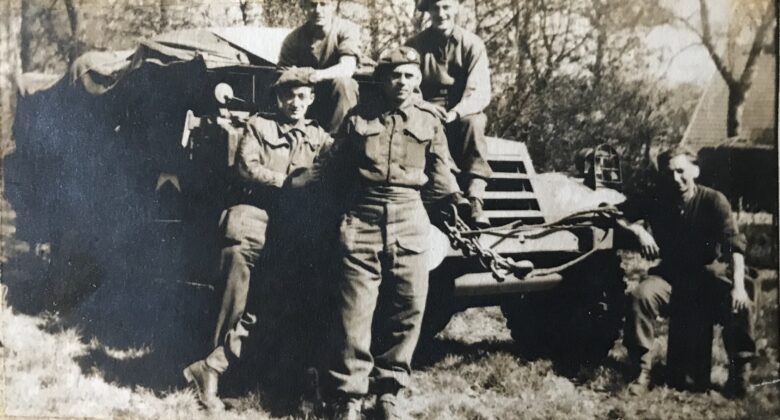The opening entry in the War Diary for 5 DCLI – the Cornish battalion – for 1 April 1945 noted:
The breakout from the Rhine bridgeheads has begun and twelve armoured columns are thrusting into the North German Plain in what is hoped to be the final battle in the West. The leading spearheads have reached points 70 miles from the Rhine.

On 5 April 1945 the “Non-Fraternization” order appeared within Battalion Orders. The diary felt compelled to explain what this actually meant, ‘that nothing whatever to do with the German people, except the minimum contact required for the execution of military duty.’
Over the next few days the War Diary records the advance towards the German city of Bremen, with intermittent delaying actions by the Wehrmacht. On 24 April there was an intense bomber raid on Bremen and by 26 April the city had surrendered. Major-General Essame, who briefly commanded 43rd (Wessex) Division of which 5 DCLI were part recorded:
Bremen presented a scene of sordid horror almost beyond description. Great piles of rubble block the streets, the twisted lamp standards silhouetted protest clear against the sky, the stench of buildings still burning offended the nostrils and the open sewers stank to heaven. The people were broken-spirited and listless. The fighting had released thousands of slave labourers from Eastern Europe and Russian prisoners, who broke loose and fell without restrained on the large stores of liquor in the town. Fighting, rape and murder broke out and our troops had to intervene.
The DCLI only stayed in the city for a few days before orders came to push the fight further into Germany. By 30 April the fighting was in Grasberg: more prisoners, spasmodic small arms fire and clearing mines were the order of the day.
On 2 May 1945, an innocuous entry in the unit diary hinted at the horrors of Belsen which had been discovered on 14 April by an SAS unit. “The concentration camp area Belsen W4867, about five miles South of Hamburg is out of bounds to all ranks.” This was because there was an epidemic of typhus in that area and the job of trying to save 60,000 acutely sick and starving Belsen survivors, had started.
On 4 May 1945 the battalion was at rest: entertainment and mobile baths are recorded in the unit War Diary and then:
‘During the evening the news was broadcast which meant the end of the war in our sector: that at 0800 hours tomorrow, 5th May 1945 would sound the “Cease Fire” in North West Germany, Holland and Denmark’.
Hugo White, a career army officer and prime mover in setting up our museum at The Keep, understood the camaraderie of a county regiment. It is right that he should have the last word about this Cornish battalion in the Second World War:
In nearly 12 months of almost continuous battle, from Normandy to North Germany, the Fifth battalion had displayed robust courage and brilliant efficiency, which time and time again had worn down and defeated some of the finest troops of the German army.
Perhaps it was prescient then, that on 6 May 1945 the Commanding Officer of the Duke of Cornwall’s Light Infantry sent a message to all soldiers regarding, ‘Conduct and bearing of the individual soldier meeting the Russian Army.’ The Second World War was over in Europe: the Cold War was about to start.

